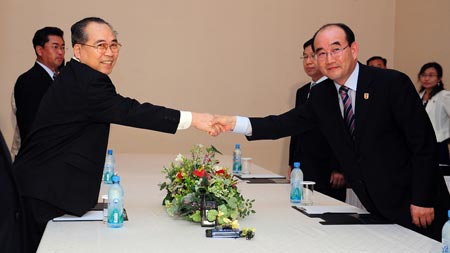|
 Kim Young-chol (R), general secretary of Red Cross of the Republic of Korea (ROK), shakes hands with Choi Song-ik, vice chairman of the central committee of the Red Cross of the Democratic People's Republic of Korea (DPRK), during their meeting in Mountain Gumgang area in the DPRK, on August 26, 2009. [Xinhua]
Kim Young-chol (R), general secretary of Red Cross of the Republic of Korea (ROK), shakes hands with Choi Song-ik, vice chairman of the central committee of the Red Cross of the Democratic People's Republic of Korea (DPRK), during their meeting in Mountain Gumgang area in the DPRK, on August 26, 2009. [Xinhua] |
The DPRK also sent a delegation to Seoul to mourn the death of former ROK President Kim Dae-jung.
The ROK media reported earlier this week that Pyongyang invited Washington's two top envoys on the DPRK to visit in what would be their first nuclear talks since President Barack Obama took office.
State Department spokesman Philip Crowley told reporters Thursday that the US has not received a formal invitation from the DPRK. He also said special envoy Stephen Bosworth plans to travel to Asia soon but that he will not go to the DPRK.
Four DPRK officials visited the US last week to meet American relief organizations and discuss the resumption of food aid to the country, the Yonhap news agency reported Friday. But their trip did not include meetings with US government officials, it said, citing unidentified sources in Washington.
Following their first-ever summit in 2000, the two Koreas regularly held family reunions until late 2007. Then, ties frayed badly after conservative ROK President Lee Myung-bak took office last year with hard-line policies such as linking aid to Pyongyang's disarmament.
That angered the DPRK, prompting it to suspend reconciliation talks and major joint projects.
More than 16,000 Koreans have been united in temporary face-to-face reunions so far, while some 3,740 others saw their long-lost relatives in video reunions.

